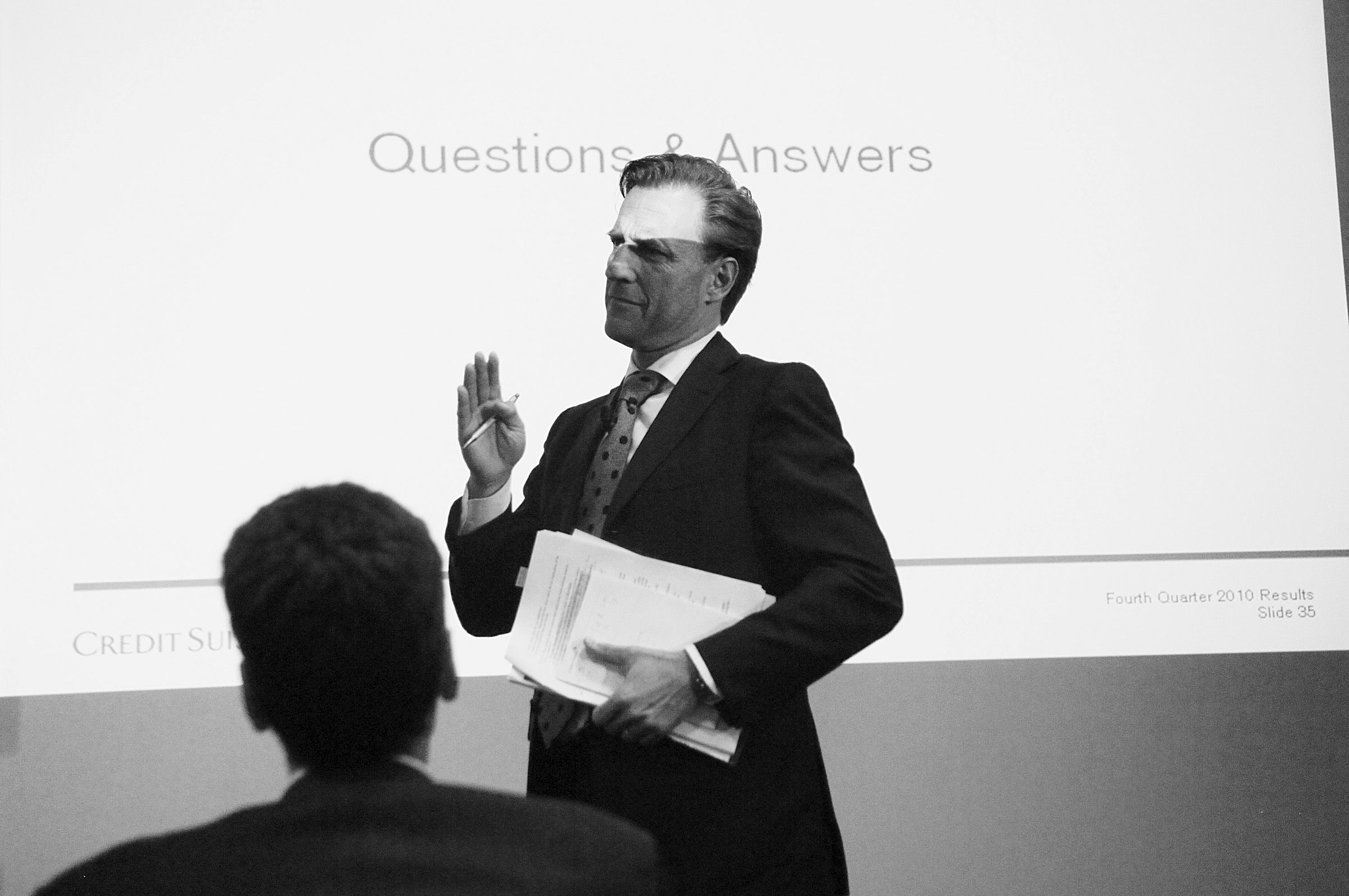Ambassador believes worst may be over in tax row

The United States’ probe into tax cheats hiding assets in Swiss banks has reached its “low point”, according to America’s ambassador to Bern.
After the criminal indictment of Switzerland’s oldest bank, Wegelin, and its decision to sell off most of its business, the only way is up, ambassador Donald Beyer tells swissinfo.ch.
Beyer says the tax dispute has easily been his biggest challenge in his two and a half years on the job in Switzerland – and would continue to be his “number one priority”.
He notes that, “like the canary in the coal mine”, Switzerland was the first country to raise issues about the fall-out of the Foreign Account Tax Compliance Act (Fatca).
That coupled with Swiss bank’s rejection of some US citizens as clients, saw around 100 Americans in Switzerland give up their US citizenship in the past year. Meanwhile, over 11,000 Swiss applied for the US Green Card Lottery.
swissinfo.ch: The US tax probe has been dominating the Swiss-US relationship of late. Won’t these relations become more delicate as investigations continue into various Swiss banks?
Donald Beyer: My sense is that we’ve already hit the low point, with the Wegelin indictment and the Wegelin decision to spin off most of its assets to Raiffeisen. The other banks seem eager to participate and to cooperate. In the newspapers recently you saw both Credit Suisse and Julius Bär eager to say we want to come forward and help in any way we can. My sense is that a few of the banks involved would turn over the data if they were allowed to under Swiss law. So far they don’t feel that they are allowed to and are awaiting a resolution between the two governments.
We talk to [Swiss] State Secretary Michael Ambühl regularly and I talk to the Internal Revenue Service and Justice Department regularly. All these processes move much slower than we would like but they all seem to be moving forward.
swissinfo.ch: Do the Swiss understand the US perspective on the tax probe and what kind of opportunities have you had to explain Washington’s position to the Swiss authorities?
D.B.: I am not sure whether the average Swiss citizen understands it completely because these are difficult issues. But I certainly think that the government, the ministers, they understand it very, very well. And they’ve been very constructive in trying to come to a good solution. There is tension. But the thing that we keep trying to emphasise is this is not an attack on Swiss banks, that this is an attempt to hold a couple thousand Americans who cheated on their taxes in the United States accountable for paying their taxes.
swissinfo.ch: What do you say to all those honest American taxpayers who have close ties with Switzerland but are under suspicion because of their Swiss bank accounts or are being shunned by Swiss banks due to their US citizenship. Some of whom are even giving up their passports as a result of this and the Fatca…
D.B.: We need to differentiate. On the one hand there certainly are American expats here who have had trouble getting Swiss bank accounts. Just as there are Swiss in the United States who have had trouble keeping their Swiss bank accounts. And our advice has been to be patient and persistent. Patient because there is no law or regulation in Switzerland or the United States forcing the banks to make these decisions. Individual banks are making their own business decisions, such as ‘I don’t want to do business with an American client’. And they do that because they have fear, uncertainty, and they don’t know whether IRS investigations could somehow put them at risk.
There were enormous concerns around the world initially [about Fatca]. The Swiss get credit for being the very first – the canary in the coal mine – to pay attention to the possible unintended consequences. I have a number of times fed back to the State Department specific concerns raised by Swiss bankers and members of Swiss government about Fatca. And the good news is the US government is taking it seriously.
While I can’t say that there is no connection between Fatca and the citizenship renunciations, there’s a different but important way to look at this. Last year there were 1,708 citizenship renunciations worldwide. There were 100 plus here in Switzerland. Most are folks who were born in the US but have lived in Switzerland all their life and intend to live in Switzerland for the rest of their life, and they didn’t want to put up with Fatca or the responsibility to file taxes or anything else.
What’s really interesting is that in the fiscal year 2012 we had 11,539 Swiss apply for the Green Card Lottery. We had 100-something give up their citizenship. That’s a 110:1 ratio.
swissinfo.ch: How much is the strong franc and the tax dispute hurting US businesses and trade with Switzerland? According to investment promotion agencies for Zurich, Geneva and Bern, American companies are putting investment plans on hold until the tax situation is resolved…
D.B.: I haven’t heard that, but I haven’t heard the contrary either. Things are still pretty good. The strong Swiss franc always has an impact. But we still get an awful lot of American tourists. Conversely we had 470,000 Swiss tourists to the US last year, which is a 23 per cent increase over the year before.
In 2010 Switzerland was the number one foreign direct investor in the US economy. Swiss business and investors put more in the US economy than any other country. 2011’s final statistics are going to be way up at the top. We now have well over 600 US companies with headquarters or operations here in Switzerland, a very vibrant community, and we have a number of states that are eager to come here in 2012 to do trade missions to Switzerland, because they see this as a great market.
swissinfo.ch: What do you need to achieve before the end of your term here?
D.B.: Priority number one: resolve the banking issues. And I think everyone recognises that these are essentially legacy issues, left over from old decisions, when you didn’t have treaties and laws and a consciousness in place that hopefully will never bring these issues to the fore again. We need to get over these legacy issues.
Number two would be developing the information sharing agreements that allow visa waivers to continue. There’s a big number of European countries that have already negotiated these including Austria which has just as strict privacy laws as Switzerland. The federal government gave a mandate to the Federal Police Office two or three weeks ago to work on this and negotiate this, so hopefully we’ll get that done.
UBS became the first Swiss bank to fall foul of US justice when it was fined $780 million in 2009 for aiding and abetting tax evaders.
The following year, the Swiss government agreed to hand over nearly 4,500 UBS clients to the US authorities. The deal was ratified by parliament last year.
Two tax amnesties in the US – a third started in January – netted more than 30,000 tax evaders, enabling the IRS to gather evidence on more Swiss banks.
Several Swiss bankers and lawyers have been arrested or indicted in the US in the past few months. These included three Wegelin executives who were indicted on January 3. On January 27 Wegelin announced it would sell most of its business to the Raiffeisen banking group.
On February 3, the US indicted Wegelin for aiding and abetting tax evaders, the first time a foreign bank has been formally charged in such a way in the US.
Currently the US Department of Justice has 11 Swiss banks or the Swiss-based operations of foreign banks in its sights.
The Foreign Account Tax Compliance Act (Fatca) was passed in the US in 2010. It was designed to close loopholes in existing tax compliancy regulations.
The law obliges foreign firms to report offshore accounts and security trades by US clients that amount to more than $50,000. If they fail to do so, they will be hit with a 30 per cent withholding tax.
It could cost each foreign bank $100 million to implement the law, which has resulted in protests from many governments.
The US has now released a 388 page document on how Fatca should be implemented and launched a consultative period that will last until May 1. It plans to bring Fatca into force in stages, starting as early as next year.
Donald Beyer was appointed US ambassador to Switzerland by President Barack Obama in June 2009. He took up his duties on August 15, 2009.
Beyer, who was born in Italy, owned a successful car dealership business near Washington, D.C., and served as lieutenant governor of Virginia from 1990-1998.
He headed Obama’s campaign fundraising efforts for the Mid-Atlantic region and raised at least $500,000 (SFr460,000) for Obama’s 2008 presidential bid.

In compliance with the JTI standards
More: SWI swissinfo.ch certified by the Journalism Trust Initiative















You can find an overview of ongoing debates with our journalists here . Please join us!
If you want to start a conversation about a topic raised in this article or want to report factual errors, email us at english@swissinfo.ch.